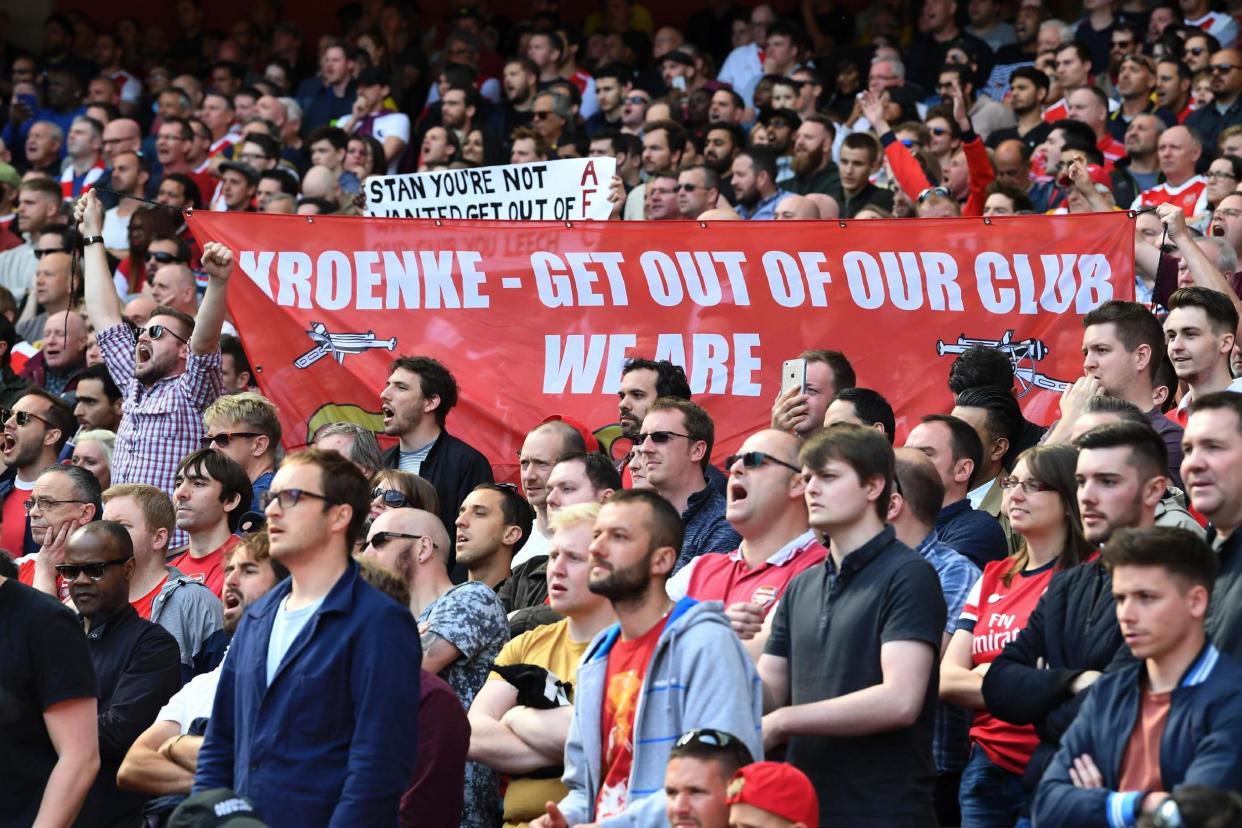Time for silent Stan Kroenke to speak up as Arsenal fans vent their fury

Stan Kroenke and the Arsenal board have hidden behind Arsene Wenger for too long.
Arsenal’s majority shareholder has been able to pull off the ‘Silent Stan’ act since his 2011 takeover, chiefly because of Wenger’s capacity to maintain the club’s place in the top four.
Although a degree of protest has been aimed at Kroenke for his unwillingness to engage with fans, aside from a token short speech at Arsenal’s AGMs, Wenger has been a lightning rod for criticism over many years.
It has taken its toll. After the Gunners’ Europa League fate was confirmed, despite beating Everton 3-1 on the final day with a spirited performance, Wenger spoke of the “absolutely horrendous” psychological environment his players have had to endure.

“Some reasons you know about and that’s very difficult for a group of players to cope with,” he said. “There are some other reasons that we will talk about some other day.”
Wenger admitted the uncertainty over his own future had contributed to Arsenal’s difficulties, a belated revelation after months of denials. There have been training ground disagreements, fan unrest and a destabilising reluctance of the club’s two best players to sign contract extensions.
But everything is rooted in the way Wenger’s situation is being handled. Kroenke and chief executive Ivan Gazidis have long held the belief that Wenger (right) deserves to dictate the timing of his own departure in recognition of the job he has done at Arsenal over the past 21 years.
However, Arsenal drifted in the second half of the campaign because that was exactly what was happening off the pitch: Wenger wrestled with the decision whether to stay on as manager next season as the team suffered seven defeats in 12 games, which left them with just the FA Cup to play for.
Gazidis has since spoken of that period as a “catalyst for change” and while Wenger later claimed he had no idea what that meant, the informed interpretation is that the club have to begin planning for life without the Frenchman regardless of his decision.
That took the form of quietly beginning a search for a director of football, an appointment which would inject a degree of sporting expertise at a senior level aside from Wenger.
But Wenger has seen this strategy as an affront to his authority. When questioned by Standard Sport earlier in the month, he flatly rejected the idea such a role would be created, sarcastically suggesting: “I don’t know what director of football means — is it somebody who stands in the road and directs play left and right?”
Wenger consistently reframes questions over his future as an issue of loyalty. He did so again yesterday, claiming: “I said ‘no’ to every club in the world to stay here, with very restricted finances, for years”.
There is not a single person in football questioning his loyalty. The question is whether he is still the right man to lead Arsenal forward.
And, fundamentally, Kroenke still believes he is. A contract was initially offered in the early part of the season and terms will be discussed again at a board meeting next week.
Kroenke — or more likely Gazidis given he runs the club on a day-to-day basis — should explain why. The absence of any public leadership has contributed to the apathy among supporters. Many feel they are shouting into a void. Wenger is consequently put in the invidious position of privately knowing his employers want him to continue yet publicly he alone is left to justify that stance.
The 67-year-old Frenchman has made plenty of mistakes. The failure to recruit the right players has been central to Arsenal’s fifth-place finish: Arsenal need a centre-back, a central midfielder and a striker this summer. The fact they signed a player in each of those positions last summer at a total cost of almost £90million is a damning indictment of their existing transfer strategy.
It could reasonably be argued Wenger should move on after the FA Cup Final, regardless of the outcome, to allow a new manager the chance to reinvigorate a team that has stagnated.
Whatever happens, leadership at the top of the club is required. Either part company with Wenger and move on or impose the restructuring decisively. The current middle ground of edging towards the future while clinging on to the past has left Arsenal in a mess. It was not a coincidence that supporters yesterday turned the ire away from Wenger and towards the owner.
“Stan Kroenke, get out of our club,” they sang as fifth place was confirmed, while their anger would have intensified today after Kroenke announced the club was nor for sale.
Paralysis has prevailed to this point but once Wenger’s future is determined, contract talks can resume with Alexis Sanchez, Mesut Ozil and the other players with a year left on their deals.
This is the biggest summer Arsenal have faced in years. They have to get key decisions right. Relying on Wenger by himself has been the easy way out. The others must step up - and a 41-word statement declaring the club is not for sale is nowhere near enough.
Alisher Usmanov is willing to make changes, having made a £1billion takeover bid which was dismissed.

 Yahoo News
Yahoo News 
